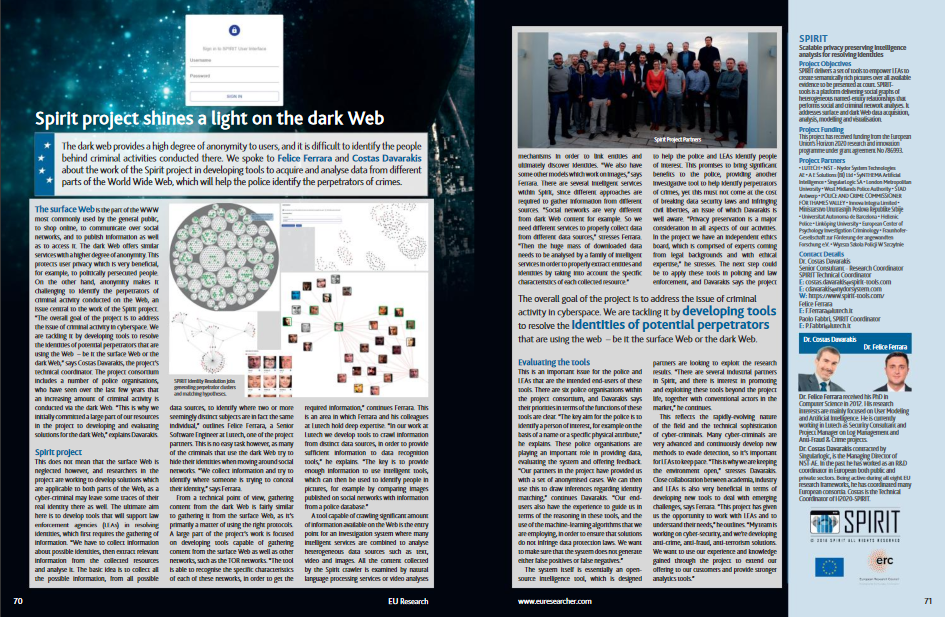SPIRIT’s Participation in ANITA’s Sister Project Final Workshop

SPIRIT participated in the final event/workshop of ANITA sister project, presenting a short demonstration of the SPIRIT technologies.

SPIRIT participated in the final event/workshop of ANITA sister project, presenting a short demonstration of the SPIRIT technologies.

SPIRIT PROJECT SHINES A LIGHT ON THE DARK WEB
Article publication of SPIRIT project in EU research magazine.
See the publication hereAuthors:
Costas Davarakis, SPIRIT Technical Coordinator, Nydor System Technologies
Felice Ferrara, Lutech
Michael Phillips, Hassan B. Kazemian from London Metropolitan University, partners of SPIRIT project and Mohammad Hossein Amirhosseini from University of East London, presented the paper "A Rule and Graph-Based Approach for Targeted Identity Resolution on Policing Data", at the 2020 IEEE Symposium Series on Computational Intelligence (SSCI), that took place in Canberra, Australia.
In criminal records, intentional manipulation of data is prevalent to create ambiguous identity and mislead authorities. Registering data electronically can result in misspelled data, variations in naming order, case sensitive data and inconsistencies in abbreviations and terminology. Therefore, trying to obtain the true identity (or identities) of a suspect can be a challenge for law enforcement agencies. We have developed a targeted approach to identity resolution which uses a rule-based scoring system on physical and official identity attributes and a graph-based analysis on social identity attributes to interrogate policing data and resolve whether a specific target is using multiple identities. The approach has been tested on an anonymized policing dataset, used in the SPIRIT project, funded by the European Union’s Horizon 2020. The dataset contains four ‘known’ identities using a total of five false identities. 23 targets were inputted into the methodology with no knowledge of how many or which had false identities. The rule-based scoring system ranked four of the five false identities with the joint highest score for the relevant target name with the remaining false identity holding the joint second highest score for its target. Moreover, when using graph analysis, 51 suspected false identities were found for the 23 targets with four of the five false identities linked through the crimes they had been involved in. Therefore, an identity resolution approach using both a rule-based scoring system and graph analysis, could be effective in facilitating the investigation process for law enforcement agencies and assisting them in finding criminals using false identities.
Authors:
Michael Phillips, London Metropolitan University
Mohammad Hossein Amirhosseini, University of East London
Hassan B. Kazemian, London Metropolitan University
On July 15th 2020, SPIRIT presented the second Year prototype platform at the UIA ‘Be Secure - Feel Secure’ Workshop, which was organised by The City of Piraeus and the Hellenic Police. It was a conventional workshop after a long time due to COVID-19 restrictions
On 24 June 2020, SPIRIT participated in the CoU FCT workshop on organised crime and cybercrime: Synergies, complementarities, platforms
The SPIRIT project will take a novel approach in the development, testing, training and evaluation of a new scalable privacy preserving intelligence analysis for resolving identities system prototype.
Project Coordinator: Mr. Paolo Fabbri (LUTECH SPA.)
Project Technical Coordinator: Dr. Costas Davarakis (Singularlogic SA)
Project Support, Dissemination & Communication: NST AE
A Plenary Meeting took place in Linköping on July 17-19, 2019
Published on 20 July 2019
A Technical Meeting took place in Ilmenau on June 12-13, 2019
Published on 16 June 2019